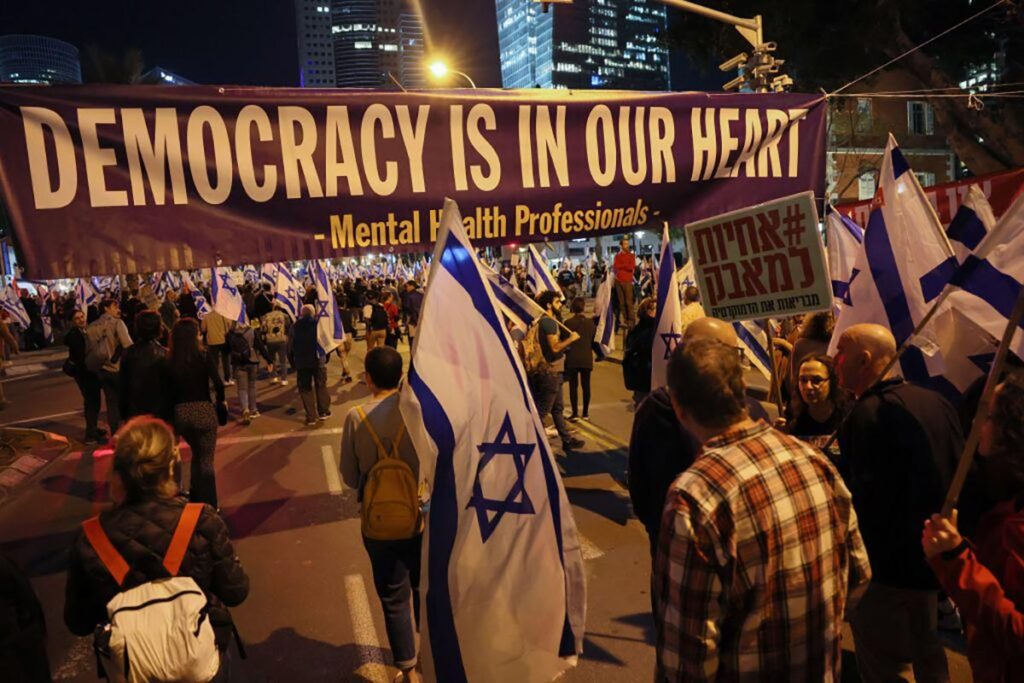
What are the 10 biggest questions about the judicial reforms? Sara Himeles asks and answers.
Click on a question below to jump to the answer:
- What exactly are the judicial reforms?
- What do Israelis think about the reforms?
- How are Israelis protesting the plan?
- Is a compromise agreement possible?
- How soon would the measures be enacted?
- Would the judicial reform mean the end of Israeli democracy?
- Everyone is talking about a “constitutional crisis.” What does it mean?
- The judicial crisis seems to have happened overnight. How did we get here?
- How would the reforms affect Netanyahu’s corruption trial?
- How is the rest of the Jewish world reacting to the reforms?
1. What exactly are the judicial reforms?
There are three main parts of the government’s judicial reform plan: the override clause, removing the “reasonability test,” and changes to how judges are appointed. Let’s briefly go through them.
There are three main parts of the government’s judicial reform plan: the override clause, removing the “reasonability test,” and changes to how judges are appointed. Let’s briefly go through them.
Override clause:
First, the reforms would introduce an “override clause” which would significantly limit the Court’s power of judicial review.
Currently, the Supreme Court can strike down any law it finds to be unconstitutional — even though Israel doesn’t have a constitution but instead has semi-constitutional Basic Laws.
With the reforms, the Knesset could override the Supreme Court’s decisions with a simple majority of 61 votes out of the 120-seat Knesset.
Reasonability test:
Second, the Supreme Court would no longer be able to make decisions on the grounds of “reasonability.” The court just used this in January when it ruled that the appointment of Aryeh Deri as a government minister was “highly unreasonable” due to his past criminal convictions.
Proponents of the reforms claim that “reasonability” is a vague metric that gives the court too much judicial leeway. The other side says that some sort of standard is necessary to allow the court to overrule laws or decisions that are corrupt or problematic.
Appointing judges:
Third, the legislation would give the government effective control over appointing judges. Currently, judges are chosen by a committee of nine members, including three Supreme Court judges, two Israel Bar Association representatives, and four ministers and Knesset members.
Under the reforms, the two Bar Association representatives would be replaced by two “public representatives” chosen by the justice minister. This would give the sitting government a majority of the votes for selecting judges.
2. What do Israelis think about the reforms? What are the best arguments for and against the judicial reform?

Both sides have extremely strong opinions about this proposal. However, several polls have found that a majority of Israelis oppose the legislation, including close to half of those who voted for Netanyahu’s Likud party.
So, what are the best arguments of the different sides? Opponents of the reform argue that, by dramatically weakening the Supreme Court, the legislation would shift all the power to the Knesset and the ruling coalition of the day.
This would leave the government without checks and balances, raising concerns about a “tyranny of the majority,” they argue.
Proponents of the reform say that the Supreme Court has grown overly powerful and has intervened inappropriately in the Knesset’s lawmaking authority, without any statutory authority to do so. They argue that power should be shifted back to the democratically-elected Knesset.
Others advocate a middle position, saying that the judiciary needs reform, but that the current proposal goes too far. Retired Supreme Court justice Hila Gerstel expressed this view, saying at a recent rally in Tel Aviv that she supports “repairs” to the judiciary but not its “destruction.”
To hear three perspectives advocating for the reforms, against the reforms, and an in-the-middle position, check out this op-ed by attorney Yonatan Green, this podcast with Israel Democracy Institute’s Suzie Navot, and this interview with constitutional law professor Yaniv Roznai.
3. How are Israelis protesting the plan?

Tens of thousands to hundreds of thousands of Israelis have protested against the plan for 13 consecutive weeks, across the country, since Justice Minister Yariv Levin announced the plan in early January.
Here’s the latest news on the protests. On March 26, after Netanyahu announced he was firing his defense minister and fellow Likud member Yoav Gallant, massive crowds of Israelis spontaneously poured into the streets. The day before, Gallant gave a televised speech in which he urged the premier to pause the legislation, warning:
“I see the source of our strength eroding. The growing rift in our society is penetrating the IDF and security agencies. This poses a clear, immediate, and tangible threat to the security of the state. I will not lend my hand to this.”
Gallant was referring to the hundreds of reserve air force pilots and other officers who have vowed that they will not show up for duty if the judicial reforms are enacted. Some have also skipped flight trainings in protest of the government’s plan.
The protesters blocked a major highway in Tel Aviv as well as other streets and bridges, and lit bonfires on the roads, while waving Israeli flags and chanting, “Democracy!” and “We are not afraid!” Mounted police fired water canons into the crowd to disperse them.
VIDEO Thousands have gathered within the hour in front of the Defense Ministry in Tel Aviv to protest PM Netanyahu’s decision to fire Defense Minister Yoav Gallant. Protesters are burning tires and blocking Ayalon highway in both directions. Unprecedented images for this city. pic.twitter.com/axIuwXoPOw
— Michael Shuval 🏳️🌈 (@MichaelShuval) March 26, 2023
Raising the tension even further, the next day, on March 27, Israel’s top labor federation announced a general strike, which resulted in the closure of Ben-Gurion Airport and large parts of the economy.
Faced with all of this pressure, that night, Netanyahu announced that the voting on the plan would be temporarily suspended to provide an opportunity for dialogue.
בפעם החמישית ברציפות, 150 מפגינים בגוש עציון. ״גשר צר מאוד״ pic.twitter.com/YLrR862jVt
— Ben Caspit בן כספית (@BenCaspit) March 11, 2023
Many Israeli tech leaders have also spoken out against the plan and the damage they say it would bring to Israel’s economy and position as a tech powerhouse.
According to Yair Geva, head of the tech division at Tel Aviv-based law firm Herzog Fox & Neeman, as a result of the legislation, many Israeli entrepreneurs are incorporating or reincorporating their startups outside Israel, often at the request of investors.
“Since the start of the judicial overhaul, we are seeing almost 100% of new startups incorporating in the US as opposed to Israel, whereas before, the vast majority was setting up in Israel,” Geva told The Times of Israel.

“This means that over time Israeli companies won’t be identified as such. They’ll be able to quickly liquidate activities here and go elsewhere, resulting in job losses, intellectual property (IP) loss and tax losses. All of this will compromise the Israeli tech brand,” he added.
Israeli tech employees, however, are divided on the plan and its impact on the economy. A recent survey found that only 12% of tech employees said they participated or plan to participate in the protests. Meanwhile, when asked whether the reform endangers Israel’s economy, 41% said no and 39% said yes.
4. Is a compromise agreement possible?

Israeli President Isaac Herzog has been holding compromise talks this week, after Prime Minister Netanyahu announced he was pausing the legislative process.
However, after a meeting at the President’s Residence in Jerusalem on March 31, senior officials involved told Channel 12 News that the negotiations are already “dead in the water.”
The coalition insists that it control the selection of judges, which is a non-starter for the opposition, blocking any possible path forward.
Whether either side will be willing to compromise on its core principles remains unclear.
Representing one end of the spectrum, former attorney general Avichai Mandelblit said: “I am always for compromise and negotiations, but you can’t compromise on the government appointing their own judges…There is no way you can compromise on…the Supreme Court’s independence.”
Tel Aviv University economist Dan Ben-David said that many coalition members are also unlikely to compromise, but added that the protests could sway them to soften the plan.
“They want to nominate the judges, they want to be able to overrule the judges, they want the executive branch to control the judicial branch — and they won’t agree to anything in the middle,” he told The Jerusalem Post.
On March 9, President Herzog came out strongly against the current proposal, saying in a special address to the nation, “The package of legislation currently being discussed in the [Constitution] Committee needs to disappear, and quickly.”
“It is wrong, it is oppressive, it undermines our democratic foundations. And therefore, it must be replaced with another plan, one that has consensus,” he added.
Herzog announced a compromise plan in mid-March, but the coalition swiftly rejected it. “Many parts of his proposal only perpetuate the current status and do not restore the balance between the different branches of power. This is the sad truth,” Netanyahu said.
Separately, former justice minister Daniel Friedmann, former national security adviser Giora Eiland, and several other public figures proposed another compromise plan which would have moderated some of the government’s proposals.
The softened plan, however, did not bring the sides closer together. Justice Minister Yariv Levin responded favorably, calling it a “breakthrough.”
But the overhaul opponents said that it would still weaken the Supreme Court to the point that it would no longer check the power of the Knesset.
5. How soon would the judicial reform be enacted?
On March 27, Netanyahu announced he was temporarily suspending voting on the plan, following 12 weeks of massive demonstrations and a general strike by the country’s top labor federation, which resulted in the closure of Ben-Gurion Airport and large parts of the economy.
He said the break would last until the end of the Knesset recess on April 30.
The Knesset had been scheduled to vote on a key part of the legislation — which would give the ruling coalition control over appointing judges — this past week.
The prime minister said that he was allowing a “delay” to allow for “a real opportunity for dialogue.” But he also pledged his government would eventually pass legislation to “return the balance that was lost between the [government] branches,” while “safeguarding and even strengthening individual rights.”
Following Netanyahu’s announcement, President Isaac Herzog began holding compromise talks between the two sides, but so far, they have not been fruitful, according to senior officials involved.
After a meeting at the President’s Residence in Jerusalem on March 31, senior officials involved told Channel 12 News that the negotiations are already “dead in the water.”
The coalition insists that it control the selection of judges, which is a non-starter for the opposition, blocking any possible path forward.
Meanwhile, those who oppose the overhaul are concerned that Netanyahu’s temporary pausing of the legislation is merely a delaying tactic to pass the measures in a gradual way.
The protest organizers likened the current situation to Poland in 2017, when Polish President Andrzej Duda silenced dissent by vetoing a similar proposal and calling for national unity, before enacting almost identical legislation later on.
“Just like in Poland, the government is taking time to reorganize in order to pass the judicial coup,” the protest leaders said in a statement.
6. Would the judicial reform mean the end of Israeli democracy?

Supporters of the overhaul claim that it would strengthen Israeli democracy by shifting power from the Supreme Court to the democratically-elected Knesset.
“For decades, the majority of citizens have had their voices — and the outcome of their votes — silenced by a growing tyranny of unelected officials and technocrats,” Moshe Koppel and Eugene Kontorovich of the Kohelet Policy Forum wrote in a blog post, referring to the Supreme Court.
“The proposed reforms currently under consideration in Israel’s Knesset are designed to remedy the situation by instituting some basic checks and balances on the Court — checks and balances that are the norm in other Western democracies.”
Opponents say it would end Israeli democracy or erode the country’s democratic character. According to Israel Democracy Institute vice president Suzie Navot, the supporters of the reform have the “wrong idea” of what democracy is.
“Democracy is not [simply] majority rule because if it’s the only principle of democracy, then the majority can do terrible things to the minority and you will not call it a democratic country,” Navot said on the Times of Israel’s “What Matters Now” podcast.
In addition to majority rule, a democracy also needs separation of power, the protection of minorities, rule of law, an independent judiciary, and free elections, Navot explained. “Without this, this is not a democracy.”
Former attorney general Avichai Mandelblit went even further, saying at a conference at the University of Haifa on Sunday that sidelining the judiciary “will bring us to a situation where we will no longer be a democracy. We will become a dictatorship.”
Historian and author Yuval Noah Harari agreed, writing in Haaretz, “When the only thing that limits the power of the government is its own goodwill — that is the definition of a dictatorship.”
7. Everyone is talking about a “constitutional crisis.” What does it mean?
Israeli philosopher Micah Goodman explained what a constitutional crisis would look like. “Let’s say Yariv Levin’s reforms pass completely,” he said on the Times of Israel’s “What Matters Now” podcast.
“The next day, the Supreme Court convenes, and they…decide that Levin’s reforms are unconstitutional. So they cancel it… They’re canceling the cancellation of their power to cancel,” he added.
“Without major changes to the legislation, there is a strong chance that the court would make that ruling” and “strike down” the judicial reform legislation, Amir Fuchs, a senior researcher at the Israel Democracy Institute, said. “And then we are in uncharted territory.”
In such a scenario, Israel would “have two universes,” Goodman explained. “The universe the Supreme Court is living in, where it still could cancel decisions of the government, and the universe where the government is living where it’s now liberated from the Supreme Court.”
This would be a true constitutional crisis, Israeli-American journalist Larry Derfner explained in a Newsweek op-ed:
“If the government passes revolutionary laws that the Supreme Court rules illegal, who will the public listen to, the government or the court? Who will the leaders of the army, police, Shin Bet and Mossad listen to?”
“I can’t imagine a scarier moment for Israeli democracy,” Goodman said, adding that he thinks this is unlikely to happen and is optimistic that a consensus could still be reached. “I think once we reach…that moment, anything could happen. It’s the twilight zone. It’s unfamiliar territory for us.”
8. The judicial crisis seems to have happened overnight. How did we get here?
According to journalist Haviv Rettig Gur, “Every single issue that is now burning on the Israeli agenda, that is now tearing the Israeli people apart, isn’t new.”
In fact, the origins of the current crisis go all the way back to Israel’s founding when David Ben-Gurion and the country’s other founders couldn’t reach an agreement on a constitution. Read about what happened and why Israel doesn’t have a constitution.
Because Israel doesn’t have a constitution that defines the relationship between the legislative, judicial and executive branches, “there’s a lack of legitimacy for the different branches,” Yaniv Roznai, co-director at the Rubinstein Center for Constitutional Challenges at Reichman University, told the Jerusalem Post.
“Every branch tries to think towards its own end. The very fact that we don’t have acceptable rules of the game is the reason for all the problems. If we had a proper constitution with a proper Bill of Rights and judicial review, 90% of the problems would have disappeared,” he added.
In addition, the current tension between the Supreme Court and the Knesset goes back to the early 1990s. In 1992, the Knesset passed the Basic Law of Human Dignity and Liberty, which outlined basic human rights for Israelis.
Three years later, Aharon Barak, who was then the Supreme Court president, interpreted the 1992 law to have constitutional authority, “which means that if any law contradicts that law, that Basic Law of 1992, so the law that contradicts it is illegal,” Micah Goodman explained.
From that point on, “the Supreme Court started being more active and canceling laws of the Knesset, saying that they contradicted the Basic Law of the Knesset of 1992,” Goodman continued. “So the government felt very limited in its ability to promote legislation in the parliament.”
This shaped a narrative on the Israeli right that is now being expressed in the judicial reform plan: power has shifted from the people and the Knesset to the Supreme Court. The Court exercising veto power over the Knesset created a sense on the Israeli right that the Israeli people “are being robbed of their power,” Goodman explained.
With Netanyahu’s victory in November, all of this is now coming to a head. “This is a moment of decisions — that’s not a bad thing,” Rettig-Gur said. “Moments of decision are painful, but they’re not bad.”
9. How would the judicial reform affect Netanyahu’s corruption trial?
Some believe that one of Netanyahu’s key motivators for enacting the reforms is to evade conviction in his ongoing corruption trial.
“It’s nothing new that these [judicial overhaul proposals] are the position of Yariv Levin,” former attorney general Avichai Mandelblit said in an interview in February with Channel 12.
“But Netanyahu for years never appointed him [as justice minister]. Why did he appoint him now to the position? My assessment and opinion is that Netanyahu wants to bring about a situation in which his trial does not come to an end in a proper manner,” he said.
“Netanyahu is less worried about the rule of law than the court of law, where he is on trial on charges of bribery, fraud and breach of trust,” journalist Douglas Bloomfield wrote sarcastically in the Jerusalem Post. “His zeal for judicial reform apparently began in 2016 when police began investigating him for corruption.”
So, how exactly would the reforms help Netanyahu with his ongoing trial? The coalition is now “laying the legislative groundwork to get his trial canceled, or at least delayed indefinitely,” journalist Larry Derfner explained.
“One bill would pave the way for Netanyahu to appoint a new attorney general who would drop the case against him. Another bill, not yet introduced but widely anticipated, would protect sitting prime ministers from being put on trial — and it would be retroactive to protect the current premier,” he added.
“If the government’s key bills pass, as they’re expected to, the Supreme Court will be all but powerless to cancel these laws (or any others),” he added.
10. How is the rest of the Jewish world reacting to the judicial reform?
Many Diaspora Jewish leaders and organizations, including those who are staunch defenders of Israel’s policies, have spoken out against the reforms.
In February, the Jewish Federations of North America sent an open letter to Netanyahu and opposition leader Yair Lapid, opposing the idea of judicial override and endorsing President Isaac Herzog’s call for compromise and consensus.
“We urge you to make clear that a majority of just 61 votes of the Knesset is not sufficient to override a decision of the Supreme Court,” the letter said. “The essence of democracy is both majority rule and protection of minority rights.”
In a New York Times op-ed in early March, former Mayor Michael Bloomberg wrote that Netanyahu was “courting disaster” by pushing the reform, “imperiling Israel’s alliances around the world, its security in the region, its economy at home and the very democracy upon which the country was built.”
I have never gotten involved in Israel's domestic politics, but my deep respect for its people and concern for its future has led me to speak out against the government's plan to effectively abolish the independence of its judiciary. https://t.co/l7z7t5tvwk
— Mike Bloomberg (@MikeBloomberg) March 5, 2023
Meanwhile, the Israeli-American philanthropist Miriam Adelson, wife of the late Sheldon Adelson, did not address the substance of the reforms but warned against the speedy push to enact them.
“Regardless of the substance of the reforms, the government’s dash to ratify them is naturally suspect, raising questions about the root objectives and concern that this is a hasty, injudicious, and irresponsible move.” she wrote in Israel Hayom.
“A good deal is reached through cold-eyed circumspection. Slow down!” she added. “Bad motivations never bring about good outcomes.”
Abraham Foxman, the former national director of the Anti-Defamation League, told The Jerusalem Post in December that “if Israel ceases to be an open democracy, I won’t be able to support it.”
Even the prominent U.S. lawyer Alan Dershowitz, a longtime staunch defender of Israel’s policies, told Israeli Army Radio in January: “If I were in Israel, I would be joining the protests.”
Meanwhile, in a Jerusalem Post op-ed, William Daroff, CEO of the Conference of Presidents of Major American Jewish Organizations, did not denounce the judicial reform, but expressed concern over “the debate’s tone and lack of respect.”
“Regardless of one’s view of the proposed policies, our message is clear: Israel’s political leaders must insist on a more respectful tone and debate. Democracy is not just majority rule, it is also about tolerance, acceptance, and mutual respect,” he wrote.
The Israeli journalists and authors Matti Friedman, Daniel Gordis, and Yossi Klein Halevi urged North American Jews to take a stand against the reforms.
“When an Israeli government strays beyond what your commitments to liberal democracy can abide, you have both the right and the responsibility to speak up,” they wrote in an open letter in The Times of Israel.
“Israeli leaders need to hear where you stand. North American Jews and their leaders must make clear to this government that if it continues on the path to transforming Israel into a country of which Diaspora Jews can no longer be proud, there will be no business as usual.”
However, JNS editor-in-chief Jonathan Tobin had a different take, warning American Jews to voice their opinions “with some circumspection.”
The anti-reform statements from prominent American Jewish groups “lend credence to the kind of extremist discourse that is not just fueling a partisan effort to topple a democratically elected government,” Tobin argued.
“They’re also putting their stamp of approval on the kinds of arguments about Israeli democracy and the nature of its current government that gives aid and comfort” to anti-Zionists.
Have another question about the reforms that we didn’t cover? Let us know on TikTok, Twitter, and Instagram @JewishUnpacked.
Originally Published Mar 12, 2023 09:16PM EDT


